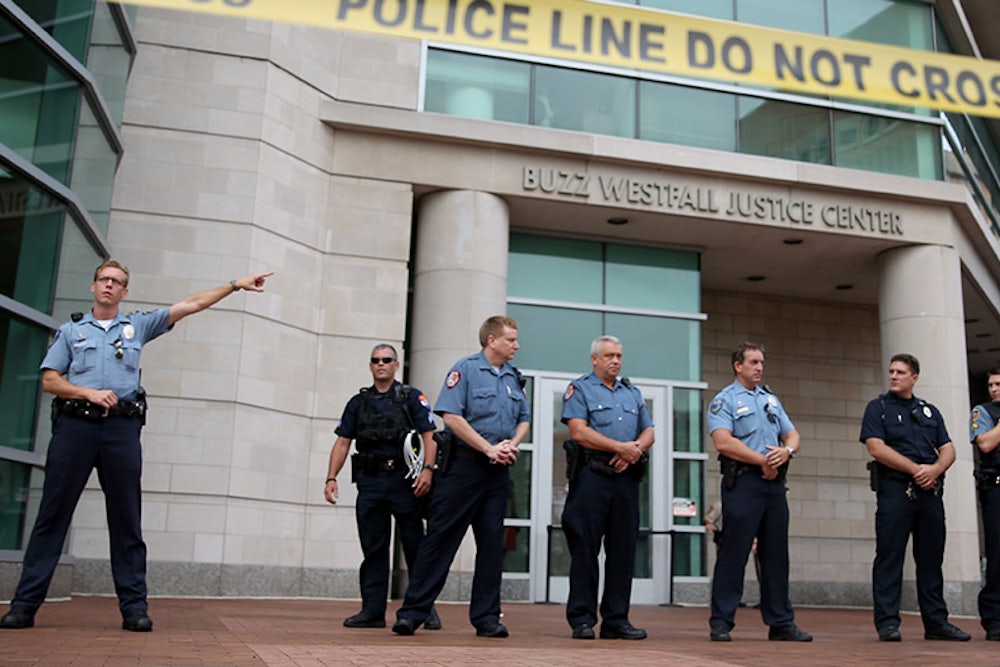On Wednesday, amid continued protests demanding “Justice for Michael Brown” prosecutors will bring evidence before a grand jury as they determine whether to indict Brown’s killer, Officer Darren Wilson. The power to indict rests with local prosecutors and pliant grand juries, and as Jonathan Cohn has pointed out, a prosecutor will usually refrain from indicting altogether if the accused faces a low likelihood of conviction. In this case, a combination of entrenched racial and occupational biases, and most importantly the details of Missouri law, all but ensures that a conviction is off the table.
We may never know what actually happened during the violent encounter between teenager Michael Brown and policeman Darren Wilson. But legal judgments rarely happen with perfect knowledge and absolute certainty. In their place, we rely on presumptions and standards that guide our thinking and discipline our judgments. In general, we presume innocence. But when we know that a killing has occurred and can definitively identify who committed the act, traditional common law demanded that our presumptions shift. We are supposed to presume guilt, and it is the shooter who must prove that his actions were justified. Unless the shooter is a policeman. And unless the victim is a black male. And unless the shooting happens in a state with self-defense laws like Missouri.
In any clash of witness testimony, police officers begin at huge advantage. Although the courts insist that juries give policemen no extra credence because of their badges as an “essential demand of fairness,” that’s not how jurors actually think or behave. Large percentages of potential jurors readily admit to giving police testimony extra weight, and many more likely act on this implicit bias. And in this case, the favoring of police testimony is compounded by another more pernicious bias: racial prejudice. Extensive research shows that Americans are far more likely to believe that African Americans—and especially young black men—have committed crimes and display violent behavior. It therefore won’t take very much to convince a jury that Officer Wilson was acting out of self-defense.
But these cultural biases are only part of the story of why a conviction will be near-impossible. The central reason is a recent trend in many states' criminal laws. Throughout history, claims of self-defense and compelling police activity have served as justifications for the use of deadly force. Most people intuitively understand that self-preservation is a basic right and that police must sometimes use violence to protect society and apprehend criminals. But generally, we expect situations of justified violence and legal killing to be the rare exception, and most people would probably imagine that policemen and citizens raising claims of justifiable homicide must meet a substantive burden of proof. But today, in states like Missouri, these justifications barely require any evidence at all.
In other states, claims of self-defense need to be proven as more likely than not, or in legal speak, to a “preponderance of the evidence.” It’s still the state’s obligation to prove “beyond a reasonable doubt” that the defendant actually killed the victim. But once that’s established, the prosecution doesn’t also have to prove “beyond a reasonable doubt” that the killing wasn’t justified. That’s because justifications—like self-defense—require the accused to make an active case, called an “affirmative defense,” that the circumstances were exceptional. The logic here is simple: As a rule, homicide is a crime and justification is reserved for extraordinary cases. Once the state has proven that a defendant did in fact kill someone, it should be the accused’s obligation to prove his or her actions were justified.
Not in most states today, including Missouri. Instead, as long as there is a modicum of evidence and reasonable plausibility in support of a self-defense claim, a court must accept the claim and acquit the accused. The prosecution must not only prove beyond a reasonable doubt that the defendant committed the crime, but also disprove a defendant’s claim of self-defense to the same high standard. Under Missouri law, all a citizen claiming self-defense or a police officer claiming to have fired while pursuing a dangerous criminal need do is “inject the issue of justification.” In other words, he only needs to produce some evidence (his own testimony counts) supporting the claim. Once he does so, “any reasonable doubt on the issue requires a finding for the defendant.” In Missouri, the burden doesn’t budge an inch, even after we know that the defendant has killed the victim. It doesn’t matter that there is certainty that Darren Wilson shot Michael Brown. As long as there is still the slightest possibility that Wilson acted in his own defense, Missouri law favors Wilson.
Within reason, legal protections for, and presumptions in favor of, policemen acting in the line of duty make sense. Society has chosen to give these men and women guns, after all. And if we expect these officers to put their lives on the line, we owe them some measure of trust and due deference. But trust cannot become a license to kill. We have a word for a situation where killing is the default, where violence is so expected that the burden is no longer on a killer to prove his actions are justified. That word is war. It has no place in suburban St. Louis.
Correction and update: A previous version of this article implied that Missouri's low burden for self-defense claims made it an outlier among U.S. states. Although historically, many states required defendants to actively prove a justification defense (and Ohio still does), in the last few decades most other states have moved away from Ohio’s approach and resemble Missouri’s. The legal situation is therefore perhaps even more troubling than originally implied. The language of the story has been updated to reflect this.
